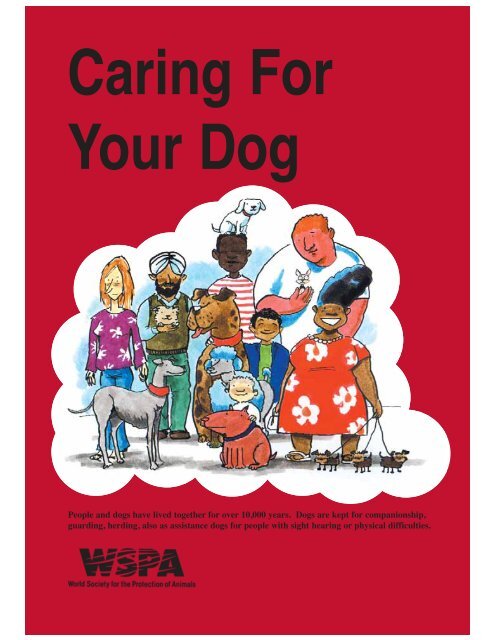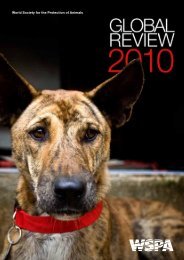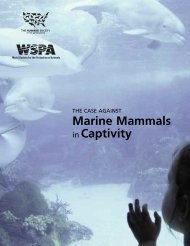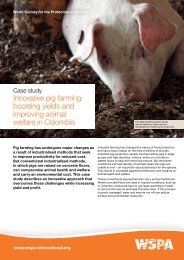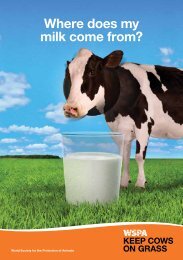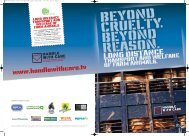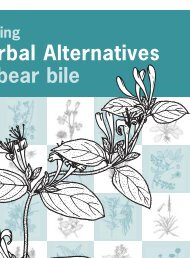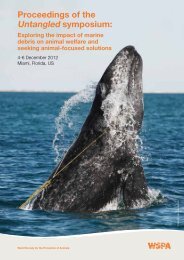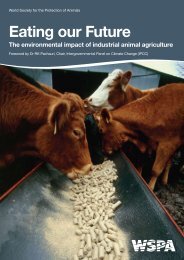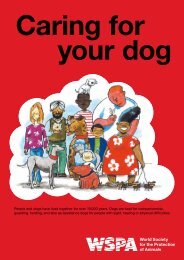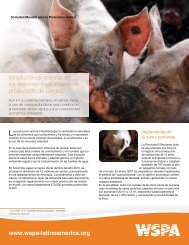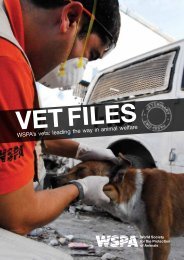Care For Your Dog - WSPA
Care For Your Dog - WSPA
Care For Your Dog - WSPA
- No tags were found...
Create successful ePaper yourself
Turn your PDF publications into a flip-book with our unique Google optimized e-Paper software.
Caring <strong>For</strong><strong>Your</strong> <strong>Dog</strong>People and dogs have lived together for over 10,000 years. <strong>Dog</strong>s are kept for companionship,guarding, herding, also as assistance dogs for people with sight hearing or physical difficulties.
How To <strong>Care</strong> <strong>For</strong> <strong>Your</strong> <strong>Dog</strong>In order to stay healthy and happy, a dog needs● a balanced diet● exercise● veterinary care,● companionshipWhere <strong>Your</strong> <strong>Dog</strong> Lives● A dog that lives outside needs a shelter to give protection from the heat or cold weather.● A dog needs comfortable bedding.● If your dog has to be tethered, use a long running line (pictured above). Fixed chains or ropecan become tangled around the dog causing injury.Food & Water● A dog needs a balanced diet of protein andfibre. Household scraps will not be sufficientto maintain good body weight or strongmuscles.● Sharp bones can be dangerous, as they maybecome stuck in the throat or cause problems ifswallowed.● Fresh water should be given daily in a clean bowl.Exercise● A dog should not be permanently tied up, he needs regular exercise.● A walk each day, and perhaps a game with a stick or ball, willhelp to keep your dog alert, active and relieve boredom.● A bored dog may bark excessively, annoying neighbours.Hygiene● A dog that is kept in dirty conditions can becomeinfested with worms, ticks, fleas or lice. Ask your vet foradvice.● Keep your dog and his living area clean.
Vaccinations● <strong>Dog</strong>s are vulnerable to many diseases which can be dangerous and costly to treat.● Vaccination helps prevent illness and reduces the risk of infection to other dogs.Grooming● Regular brushing helps to keep your dog clean and free of tangles andprovides an opportunity to check for unwanted parasites.● Grooming helps to get your dog used to being handled.Breeding● Every year hundreds of thousands of dogs are destroyedbecause there are not enough suitable homes available for them.● Female dogs can produce many puppies every year. In sixyears a pair of dogs and their offspring can produce 67,000puppies.● By constantly producing and rearing puppies, the health of afemale dog can suffer.● Pregnant and lactating female dogs need extra food.● Puppies generally suckle from their mothers for about threeweeks, gradually starting to eat additional food.● A female dog is naturally protective ofher young and can be aggressive atthis time. A quiet place shouldbe provided for them.● To prevent unwantedpuppies have your dog spayed / neutered – an operationperformed by a vetSpaying / Neutering● Modern veterinary equipment and drugs, make surgery safe, painless and recovery quick.● Ask your vet when to have your dog spayed / neutered.● <strong>Your</strong> dog does not need to have a litter before she is spayed.● Early age neutering from eight weeks of age is now accepted as a positiveaction.● Once a female dog has been neutered she will never come intoseason again and unwanted male dogs will keep away.● In a female, spaying can reduce the risk of mammarytumours.● In a male, neutering can help to reduce aggressionand roaming.
Consult <strong>Your</strong> VetRemember your vet can advise you on:● diet● training your pet● treatment against parasites● vaccination● spaying / neutering● any other health concernsDistributed By Pet RespectPet Respect is a department of the World Society for the Protection ofAnimals (<strong>WSPA</strong>) which seeks to improve the status and treatment ofcompanion animals.The World Society for the Protection of Animals (<strong>WSPA</strong>) isan international organisation working inover 100 countrieswith a network of more than 400 member societies. <strong>WSPA</strong> hasrepresentation at United Nations (UN), Council of Europe (CoE) and works inco-operation with the World Health Organisation(WHO) and the Federation ofEuropean Companion Animal Veterinary Associations (FECAVA).Local Contact89 Albert Embankment, London, SE1 7TP, UK.Tel: +44 (0)20 7587 5000 Fax: +44 (0)20 7793 0208e-mail: petrespect@wspa.org.ukwww.wspa-international.org


